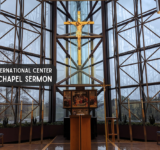Hosted by Andy Bates.
[tabs style=”vertical” title=”His Time Morning Show”][tab title=”Debate between Islam and Christianity”]
Debate between Islam and Christianity
With guest Dr. Abjar Bahkou, LCMS pastor and speaker on the themes of debate between Islam and Christianity.
——–
ST. LOUIS – Concordia Seminary’s Ethnic Immigrant Institute of Theology is presenting a free lecture focusing on the themes of debate between Islam and Christianity. The lecture will take place on Thursday, March 27, 2014, from 3:30 p.m. to 5:30p.m. in Werner Auditorium on the Seminary campus.
This unique lecture is a great opportunity for faculty, pastors, missionaries, and seminarians to better understand Muslims’ objections to Christianity. Having this understanding can be a powerful tool as they learn to share their faith in multiethnic communities.
The lecture, which is entitled, “Responding to Islam: Major Theological Themes of Debate Between Islam and Christianity,” will be led by Dr. Abjar Bahkou. Raised Syrian Orthodox, Dr. Bahkou graduated from Saint Ephraim Theological Seminary in Damascus, Syria in 1993, and then completed his doctorate in Christian Education focused on youth education in contemporary Middle Eastern culture from Salesian Pontifical University in Rome, Italy in 1998. He moved to Texas in 2004 and started his doctorate research in Arabic and Islamic Studies; he earned his second Ph.D. from Pontifical Institute of Arabic and Islamic Studies in 2008. Amidst his extensive education, Dr. Bahkou has been teaching about topics on all sides of the argument regarding Christianity, Islam, and everything in between, including Arabic literature and language. In August of 2012, Dr. Bahkou was certified as an LCMS pastor.
The Ethnic Immigrant Institute of Theology (EIIT) is a program offered by Concordia Seminary. This specialized distance program focuses on training and equipping pastors who lead immigrant-based LCMS churches. Its courses are interdisciplinary and feature unique options, including opportunities to take courses completely online, or in short-term residency on the Seminary campus.
 [/tab][tab title=”Daily Lectionary”]
[/tab][tab title=”Daily Lectionary”]
Daily Lectionary
With guest Rev. John Armstrong of Grace Lutheran Church in Columbus, IN.
Mark 7:1-23
That Which Defiles
7 The Pharisees and some of the teachers of the law who had come from Jerusalem gathered around Jesus 2 and saw some of his disciples eating food with hands that were defiled, that is, unwashed. 3 (The Pharisees and all the Jews do not eat unless they give their hands a ceremonial washing, holding to the tradition of the elders. 4 When they come from the marketplace they do not eat unless they wash. And they observe many other traditions, such as the washing of cups, pitchers and kettles.[a])
5 So the Pharisees and teachers of the law asked Jesus, “Why don’t your disciples live according to the tradition of the elders instead of eating their food with defiled hands?”
6 He replied, “Isaiah was right when he prophesied about you hypocrites; as it is written:
“‘These people honor me with their lips,
but their hearts are far from me.
7 They worship me in vain;
their teachings are merely human rules.’[b]
8 You have let go of the commands of God and are holding on to human traditions.”
9 And he continued, “You have a fine way of setting aside the commands of God in order to observe[c] your own traditions! 10 For Moses said, ‘Honor your father and mother,’[d] and, ‘Anyone who curses their father or mother is to be put to death.’[e] 11 But you say that if anyone declares that what might have been used to help their father or mother is Corban (that is, devoted to God)— 12 then you no longer let them do anything for their father or mother. 13 Thus you nullify the word of God by your tradition that you have handed down. And you do many things like that.”
14 Again Jesus called the crowd to him and said, “Listen to me, everyone, and understand this. 15 Nothing outside a person can defile them by going into them. Rather, it is what comes out of a person that defiles them.” [16] [f]
17 After he had left the crowd and entered the house, his disciples asked him about this parable. 18 “Are you so dull?” he asked. “Don’t you see that nothing that enters a person from the outside can defile them? 19 For it doesn’t go into their heart but into their stomach, and then out of the body.” (In saying this, Jesus declared all foods clean.)
20 He went on: “What comes out of a person is what defiles them. 21 For it is from within, out of a person’s heart, that evil thoughts come—sexual immorality, theft, murder, 22 adultery, greed, malice, deceit, lewdness, envy, slander, arrogance and folly. 23 All these evils come from inside and defile a person.”
Footnotes:
- Mark 7:4 Some early manuscripts pitchers, kettles and dining couches
- Mark 7:7 Isaiah 29:13
- Mark 7:9 Some manuscripts set up
- Mark 7:10 Exodus 20:12; Deut. 5:16
- Mark 7:10 Exodus 21:17; Lev. 20:9
- Mark 7:16 Some manuscripts include here the words of 4:23.
 [/tab][tab title=”Matins Sermonette”]
[/tab][tab title=”Matins Sermonette”]
Matins Sermonette
Today’s sermonette is by Rev. John Armstrong of Grace Lutheran Church in Columbus, IN.
Mark 7:1-23
That Which Defiles
7 The Pharisees and some of the teachers of the law who had come from Jerusalem gathered around Jesus 2 and saw some of his disciples eating food with hands that were defiled, that is, unwashed. 3 (The Pharisees and all the Jews do not eat unless they give their hands a ceremonial washing, holding to the tradition of the elders. 4 When they come from the marketplace they do not eat unless they wash. And they observe many other traditions, such as the washing of cups, pitchers and kettles.[a])
5 So the Pharisees and teachers of the law asked Jesus, “Why don’t your disciples live according to the tradition of the elders instead of eating their food with defiled hands?”
6 He replied, “Isaiah was right when he prophesied about you hypocrites; as it is written:
“‘These people honor me with their lips,
but their hearts are far from me.
7 They worship me in vain;
their teachings are merely human rules.’[b]
8 You have let go of the commands of God and are holding on to human traditions.”
9 And he continued, “You have a fine way of setting aside the commands of God in order to observe[c] your own traditions! 10 For Moses said, ‘Honor your father and mother,’[d] and, ‘Anyone who curses their father or mother is to be put to death.’[e] 11 But you say that if anyone declares that what might have been used to help their father or mother is Corban (that is, devoted to God)— 12 then you no longer let them do anything for their father or mother. 13 Thus you nullify the word of God by your tradition that you have handed down. And you do many things like that.”
14 Again Jesus called the crowd to him and said, “Listen to me, everyone, and understand this. 15 Nothing outside a person can defile them by going into them. Rather, it is what comes out of a person that defiles them.” [16] [f]
17 After he had left the crowd and entered the house, his disciples asked him about this parable. 18 “Are you so dull?” he asked. “Don’t you see that nothing that enters a person from the outside can defile them? 19 For it doesn’t go into their heart but into their stomach, and then out of the body.” (In saying this, Jesus declared all foods clean.)
20 He went on: “What comes out of a person is what defiles them. 21 For it is from within, out of a person’s heart, that evil thoughts come—sexual immorality, theft, murder, 22 adultery, greed, malice, deceit, lewdness, envy, slander, arrogance and folly. 23 All these evils come from inside and defile a person.”
Footnotes:
- Mark 7:4 Some early manuscripts pitchers, kettles and dining couches
- Mark 7:7 Isaiah 29:13
- Mark 7:9 Some manuscripts set up
- Mark 7:10 Exodus 20:12; Deut. 5:16
- Mark 7:10 Exodus 21:17; Lev. 20:9
- Mark 7:16 Some manuscripts include here the words of 4:23.





